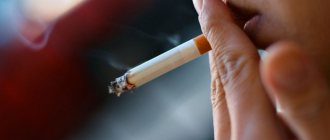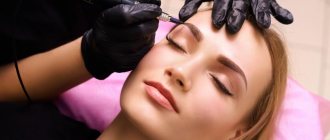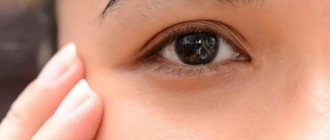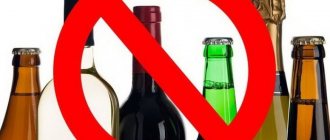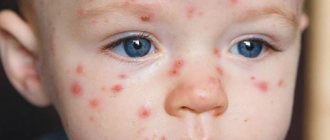Quitting drinking during and after treatment: what experts say
Antibacterial drugs contain synthetic substances that destroy viral microorganisms. They are prescribed when conventional medications are of no use. On the one hand, antibacterial drugs help cure people from very serious illnesses.
On the other hand, drugs in this group are highly toxic. It is not without reason that doctors recommend taking hepatoprotectors during the course of treatment to maintain liver function. Alcohol after antibiotics significantly increases the load on the body. Whether to drink alcohol during antibiotic treatment is an open question.
Experts identify several reasons why you should give up drinking during therapy:
- Alcohol neutralizes the effect of taking medications. The active substances of the antibiotic interact with the proteins of microorganisms, affecting them, changing their structure. Alcohol molecules modify proteins and weaken chemical bonds.
- The liver experiences heavy loads during treatment with any drugs. If a person drinks, he creates additional stress for the body. As a result, toxic hepatitis and intrahepatic cholestasis develop, the outflow of bile becomes difficult, and an inflammatory process develops in the bile ducts and liver.
- The interaction of alcohol with antibiotics can cause a significant deterioration in health. Disulfiram-like reactions are accompanied by fever, nausea, headaches, and in the worst case can lead to coma and death. Medicines of this group are used in the treatment of alcoholism.
Alcoholic drinks contain substances that promote too rapid absorption of drugs in the intestine and even faster elimination.
How long after a course of antibiotics can I drink alcohol? The duration depends on the medication and the duration of the course of therapy. Some types of antifungal drugs, as well as penicillin and heliomycin, are compatible with strong drinks in small doses. To avoid unpleasant consequences, it is advisable to avoid them altogether or consult a doctor. Combining alcohol and antibacterial drugs should be done in exceptional cases.
3-5 days after finishing taking antibiotics, doctors allow you to drink alcohol. This time is enough for toxic substances to be eliminated from the body, and it can respond adequately to alcohol. If the patient suffers from chronic forms of disease and repeatedly resorts to treatment with antibacterial drugs, one should refrain from drinking alcohol for 2-4 weeks.
Indications for use
Before going for the procedure, it is recommended that you familiarize yourself with some contraindications.
CONTRAINDICATIONS
- when a woman is pregnant, she feeds the baby with breast milk;
- if tumors of a malignant or benign nature are found anywhere;
- when a chronic illness worsened;
- if there is an inflammatory process, an infectious disease, skin pathologies;
- if you are allergic to the components of the product.
If the patient is taking antibiotics or other medications, he must tell the cosmetologist about this, since Botox is not compatible with all medications.
Alcohol after antibiotics: prospects and consequences
The opinion that absolute alcohol is incompatible with any medications has no clinically proven facts. It is a myth. There are certain types of therapy, during which doctors recommend eliminating alcohol. The consequences of use will not necessarily be fatal, but the prospect of developing possible complications is high.
The table below shows examples of negative reactions to alcohol from the body. It should be noted that an unpredictable situation can develop in response to taking completely “harmless” medications. You can find out how long after you can drink alcohol after taking antibiotics from your doctor before you start taking medications.
| Types of drugs | Result of combination with alcohol |
| Aspirin | Stomach ulcer |
| Caffeine, ephedrine, theophedrine, coldrex, coldact. | Hypertensive crisis |
| Diuretic, hypotensive. | A sharp decrease in pressure |
| Paracetamol, Panadol, Efferalgan | Toxic liver damage |
| Insulin, medications that lower sugar levels. | Drop in blood sugar, coma |
| Neuroleptics, painkillers, anti-inflammatory | Poisoning. |
| Tranquilizers, sleeping pills | Intoxication, coma |
| Sulfamides | Lack of effect, intolerance to certain substances. |
| Nitraglycerin, antihistamines | Allergies, increased pain |
Drugs of the cefocetane group slow down the chemical reaction of the breakdown of alcohol molecules. As a result, a person experiences all the signs of poisoning: dizziness, vomiting, headache, shortness of breath. Disulfiram is a drug with a high content of anti-alcohol components, which is used in narcology to treat addictions. The slightest dose of alcohol greatly worsens your health. The minimum period of abstinence from drinking strong drinks is a week.
Another drug that does not combine well with alcohol is metronidazole. Drinking alcohol after this antibiotic leads to intoxication. However, this judgment has not been scientifically confirmed. In 2003, medical scientists conducted an experiment. A small group of Finnish men were asked to drink alcohol regularly during a course of metronidazole treatment and then share their results. 5 days after starting antibiotics, it turned out that there was no negative effect from alcohol. The study organizers emphasized that in order to avoid negative consequences, you should not combine strong drinks with metronidazole.
There are several other groups of medications that cannot be combined with alcohol:
- Tinedazole;
- Linezolid;
- Erythromycin;
- Tamposil;
- Teturam;
- Sodium thiosulfate;
- Antabuse;
- Metadoxyl;
- Radoter;
- Colma;
- Cyamide;
- Esperal;
- Litonite;
- Vivitrol;
- Zorex;
- Selincro.
Doctors immediately warn patients about the dangers and consequences of combining antibacterial drugs with alcohol.
The question of how long after antibiotics can drink alcohol is of interest to many citizens. I want to drink strong drinks without fear. These fears are not in vain.
The result of combining booze with antibiotics:
- Transition of the disease into a chronic form. Microorganisms become resistant to a particular substance, and the effect of therapy disappears. The treatment process is delayed.
- Deterioration of blood counts. An increase in coagulability leads to the development of cardiovascular pathologies. The risk of stroke or heart attack increases many times over.
- The appearance of allergic reactions. A mild attack can be treated with antihistamines. In severe cases, anaphylactic shock and Quincke's edema develop.
You can find out how long after you can drink alcohol after taking antibiotics by consulting your doctor.
Compatible medications
Doctors allow the combination of strong drinks with certain types of antibacterial drugs. List of “safe” antibiotics:
- cephalosporins;
- penicillin drugs;
- macrolides.
A patient taking penicillin-based medications should abstain from drinking for 4-5 hours after completing the course. During this time, the active substances of the drug dissolve and disintegrate. Decomposition products are excreted through the excretory system.
When is drinking beneficial and when is it harmful?
The main harm that a person can cause by drinking water is the acceleration of digestive tract processes.
This can lead to health problems such as:
- bloating;
- flatulence;
- gaining excess weight.
Drinking also leads to an increased feeling of hunger just a couple of hours after lunch or dinner is over, which will significantly affect the number of calories consumed per day.
Despite this, in addition to the obvious harm, quenching thirst can also bring the following benefits to the body:
- speed up metabolism;
- prevent constipation;
- improves the condition of the skin and hair;
- maintains the body's water balance.
However, for water to be beneficial, you need to understand exactly how and what kind of water should be consumed.
Scientific approach
Researchers conducted a survey among the population of England. Of the 300 clinic patients, more than 80% believe that drinking negatively affects the effect of medications, 71% are afraid of the consequences of such a combination.
The truth is that the greatest danger lies in the development of drug resistance. Microorganisms become resistant when medications are taken unsystematically. The patient, having drunk, is afraid of the consequences, so he refuses to continue the course of treatment.
Why should you not drink alcohol during treatment with antibacterial drugs? Systematic abuse of alcohol in combination with serious medications can lead to a malfunction of organs up to their failure. Systematic drinking impairs the functioning of the immune system, so the risk of developing various pathologies increases.
Restoring the body: recommendations
How long does it take to recover from antibiotics after drinking alcohol? The doctor can tell you what the withdrawal period for a particular medicine is. Depending on the type of antibacterial drug, this period may last several days . An important criterion is the duration of the course. The longer the treatment, the more time it takes for rehabilitation.
Doctors do not allow drinking alcohol after antibiotics in several cases:
- The presence of chronic diseases in which the liver experiences a toxic load.
- Concomitant use of other medications. The recovery period in this case lasts up to 6 months.
Experts say: it takes 1 year to fully rehabilitate the body after a course of antibiotics. At this time, a person’s risk of getting colds, flu, and other infectious diseases increases significantly.
The intestines experience a lot of stress during medication therapy. Digestion is disrupted, metabolism slows down, vitamins are poorly absorbed, and allergic reactions worsen.
Experts agree that you can drink alcohol after taking antibiotics no earlier than a few weeks after stopping therapy. In some cases, it is recommended to reduce drinking to a minimum.
You can help your body return to normal by taking a course of probiotics. They are rich in bifidobacteria and lactobacilli, vitamins, amino acids, and enzymes. Probiotics are taken during or after completion of treatment for 2-3 weeks.
Product benefits:
- reducing the toxic load on the liver and kidneys;
- strengthening the immune system;
- restoration of the balance of intestinal microflora (local immunity);
- normalization of the digestive process;
- blocking toxins and allergens;
- improved absorption of vitamins.
If the course of antibiotic treatment is violated, the risk of developing resistance increases.
Alcohol after antibiotics: how long after you can drink alcohol
The elimination time of certain antibiotics varies individually. The circulatory system and blood vessels are cleared of aminoglycosides within 3 hours. Undigested drug residues located in the intra-ear fluid leave the body after 2 weeks. Uncontrolled consumption of strong drinks before this period can lead to absolute deafness.
If you have taken medications more than once, doctors recommend holding off on drinking strong drinks. This applies to all groups of drugs. You should not drink alcohol after taking antibiotics on the same day or for several hours after treatment.
Drinks classified as light alcohol (beer, wine) are allowed to be drunk 3-5 days after the end of treatment. You need to wait a bit with stronger alcohol. Doctors advise waiting 10-12 days. Failure to follow leads to negative consequences, including the death of the patient.
The most dangerous "cocktails"
Many antibiotics are not compatible with any alcoholic drink. For example:
- Fluoroquinolones, when mixed with alcohol, have a negative effect on the nervous system and can lead to coma.
- Tetracyclines linger in the body for a long time and are capable of destroying some liver cells, so drinking alcohol is possible after three days.
- Aminoglycosides can cause hearing and kidney complications (alcohol consumption is possible after 2 weeks).
- The nervous system and liver are damaged by Lincosamides (alcohol intake is possible after 4 days).
- Macrolides, especially Erythromycin, can cause cirrhosis of the liver (alcohol consumption is possible after 4 days).
- Levomycetin can provoke attacks of vomiting or convulsions (alcohol intake is possible after 24 hours).
All anti-tuberculosis drugs cause hepatitis, in which case any alcohol is prohibited.



